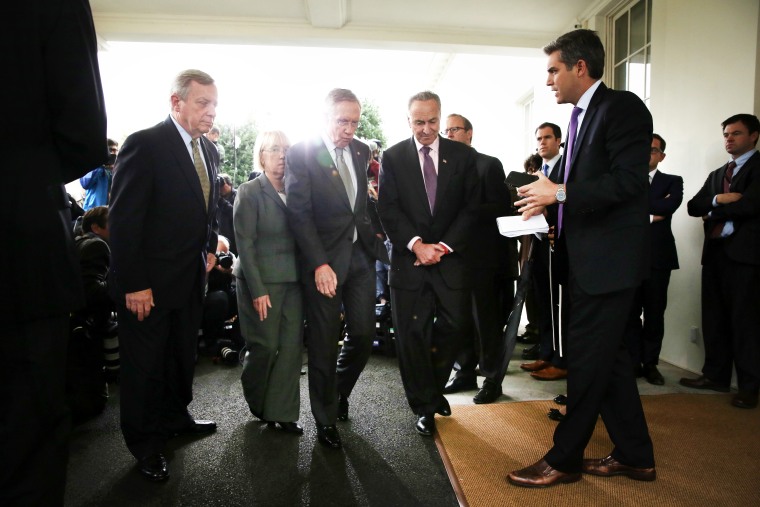A possible deal on the debt limit is still alive—for now.
Senate Majority Leader Harry Reid sounded a cautious note Thursday, following a meeting with President Obama on a GOP plan to temporarily raise the $16.7 trillion debt limit without any strings attached. However, when asked about the likelihood of the Senate voting on any extension without first reopening the government, Reid said it’s “not going to happen.”
“Let’s wait and see what the House does,” Reid said to reporters following an hour and a half meeting Thursday with Obama. “When they send us something, we’ll look as clearly and closely as we can.”
Earlier in the day, House Speaker John Boehner unveiled a Republican offer to raise the country’s debt ceiling–without any spending cuts or anti-Obamacare provisions attached–in exchange for an agreement to negotiate over the federal budget. House leaders are slated to present their plan to the White House later in the afternoon. But Reid sounded skeptical, accusing the House of having “a unique form of legislating–hour by hour.”
The majority leader’s remarks broke from those of White House Press Secretary Jay Carney, who earlier signaled that the president would prefer–not require–that Congress end the shutdown before he’d consider signing a debt ceiling increase. Carney said in his daily press briefing Thursday that if the president received a “clean” extension, with “no partisan strings attached, he would sign it.” However, he noted, it was still unclear what exactly House Republicans would be presenting later in the day.
The extension, expected to last six weeks, does not include terms on reopening the government, which has been shut down over a spending impasse for nearly ten full days. But it does stave off the risk of default–something the U.S. has never experienced in its history, and which the White House and Treasury Department have warned could produce a recession as severe as the one seen after 2008’s financial crisis.
The Treasury has said Congress must raise the country’s borrowing limit by Oct. 17, or render the government incapable of paying its bills.
A delegation of 18 House Republicans is scheduled to meet Thursday afternoon at the White House, where they will present their debt ceiling proposal. President Obama had invited all 232 Republicans in the House, but Speaker Boehner insisted that the meeting be kept to leadership members and committee chairmen.
House Republicans, and leadership aides, said that if Thursday’s meeting went well, Boehner could bring his debt limit bill to floor as soon as Friday.
Following a meeting at the White House Wednesday, Minority Leader Nancy Pelosi would not explicitly say whether her caucus would accept a short term debt limit increase, saying only of her colleagues across the aisle: “When we see them offer one, we’ll see what path that takes us down.” In a press conference Thursday, Pelosi again deferred on her decision. She did, however, say that a “six-week lifting of the debt ceiling is not the right way to go.”
Budget talks between Pelosi and Boehner went nowhere on Wednesday, after the minority leader presented a lower spending figure in exchange for a ceasefire agreement over provisions to President Obama’s signature health care law.
GOP demands to delay or defund portions of the Affordable Care Act were what sparked the government shutdown on the first of the month, and later bled into the debt ceiling debate. Republicans have since walked back their calls to derail Obamacare, replaced instead with a demand to rein in overall government spending.
The House GOP did not go as far as a motion put forth by Senate Majority Leader Harry Reid Thursday to raise the debt ceiling by $1 trillion through the end of 2014, also without any spending cuts attached. A vote on the Senate bill is scheduled for Saturday, though it remains unclear whether it can pass.
Senate Minority Leader Mitch McConnell said Reid’s bill “just won’t fly” with Republicans.
On Thursday, the House passed its 13th piecemeal bill–a measure to fund border security programs at the Department of Homeland Security–in an effort to deflect public blame for the ongoing shutdown. The Senate and White House have stood firm against the mini-funding approach that would reopen certain federal agencies while keeping other shuttered. Only one House-passed bill–a measure to ensure families of fallen soldiers receive death benefits during the shutdown–has been been considered and approved in the Senate.
